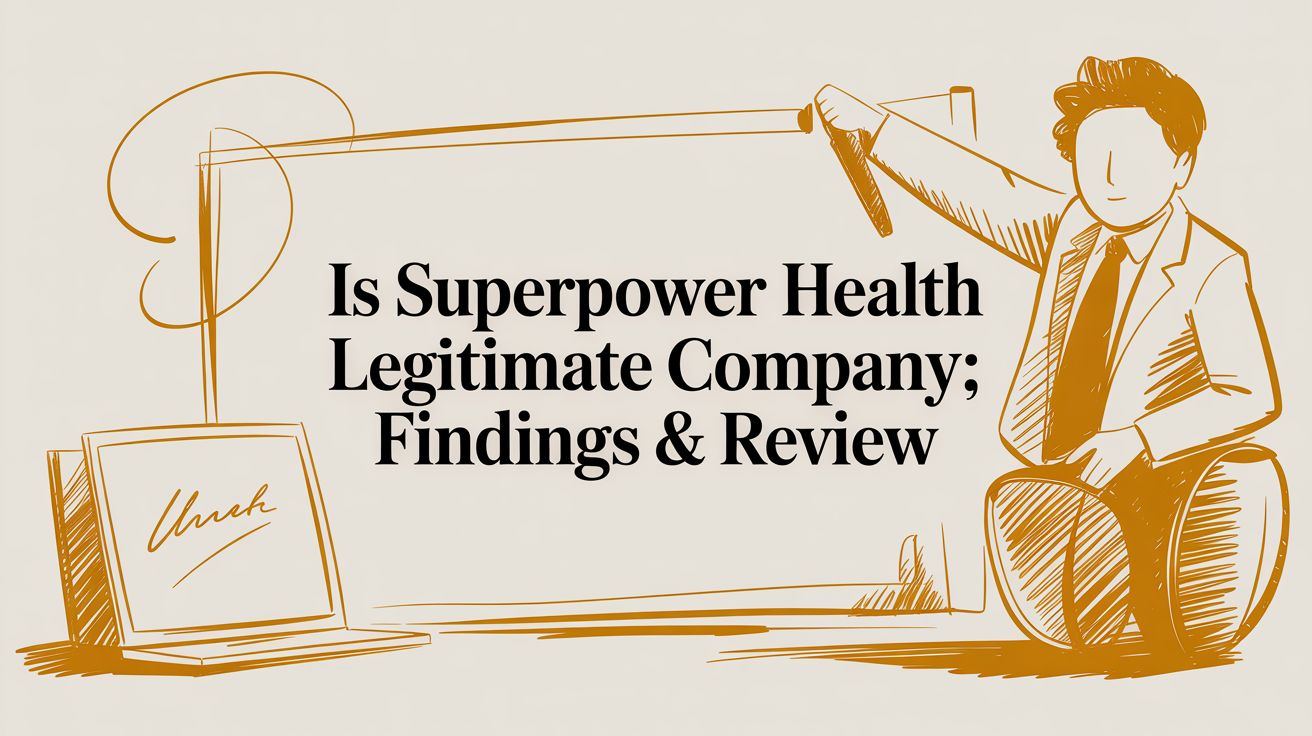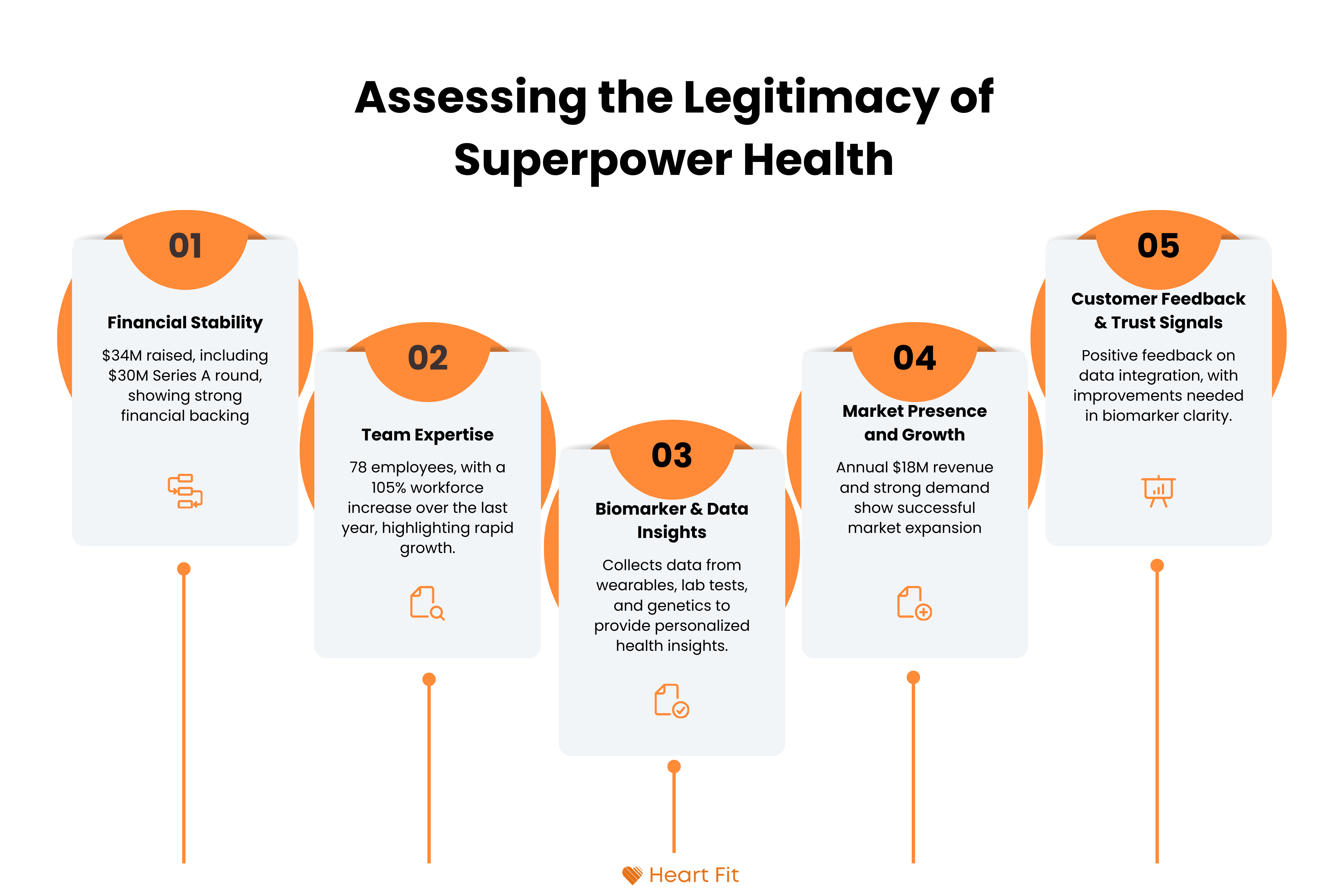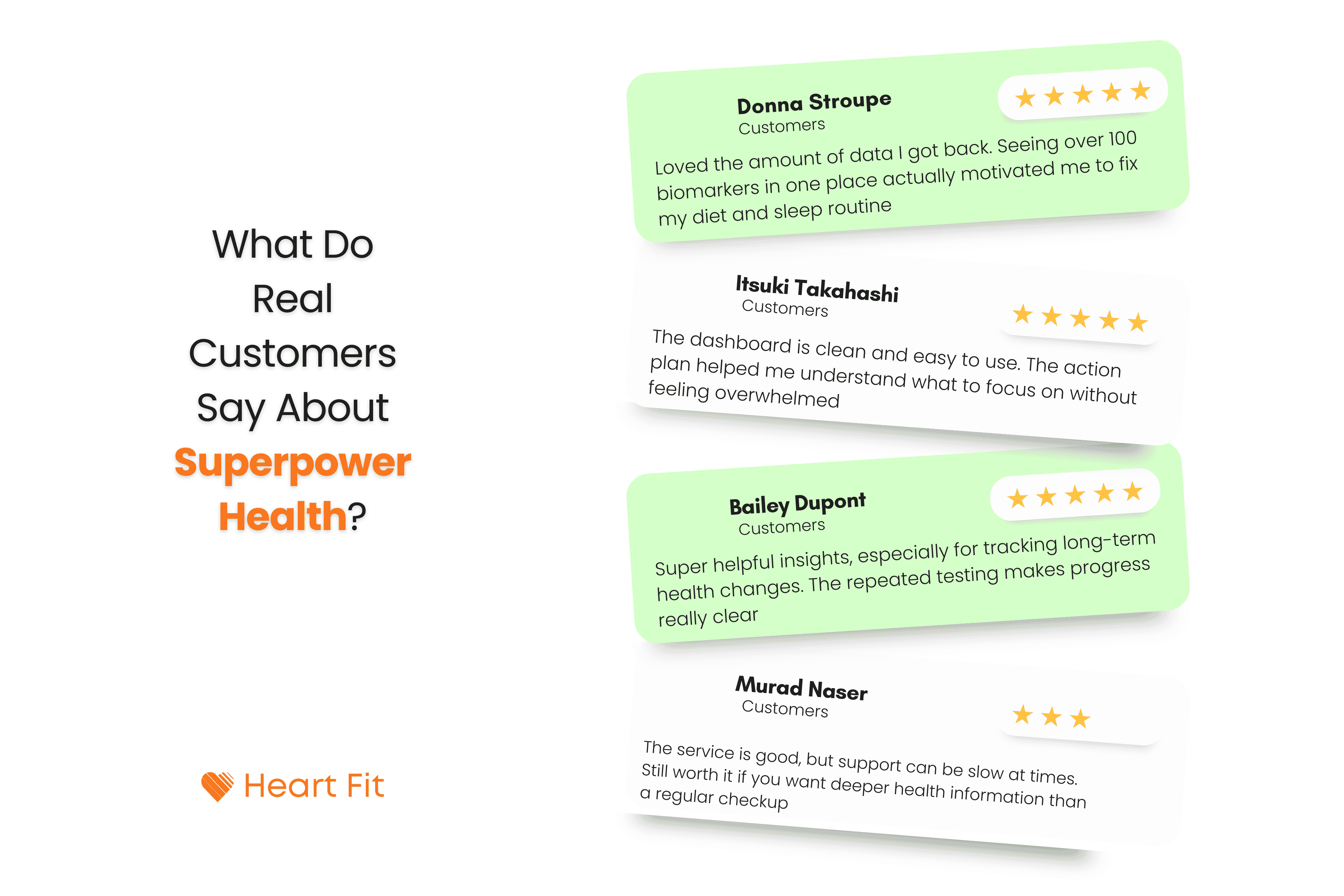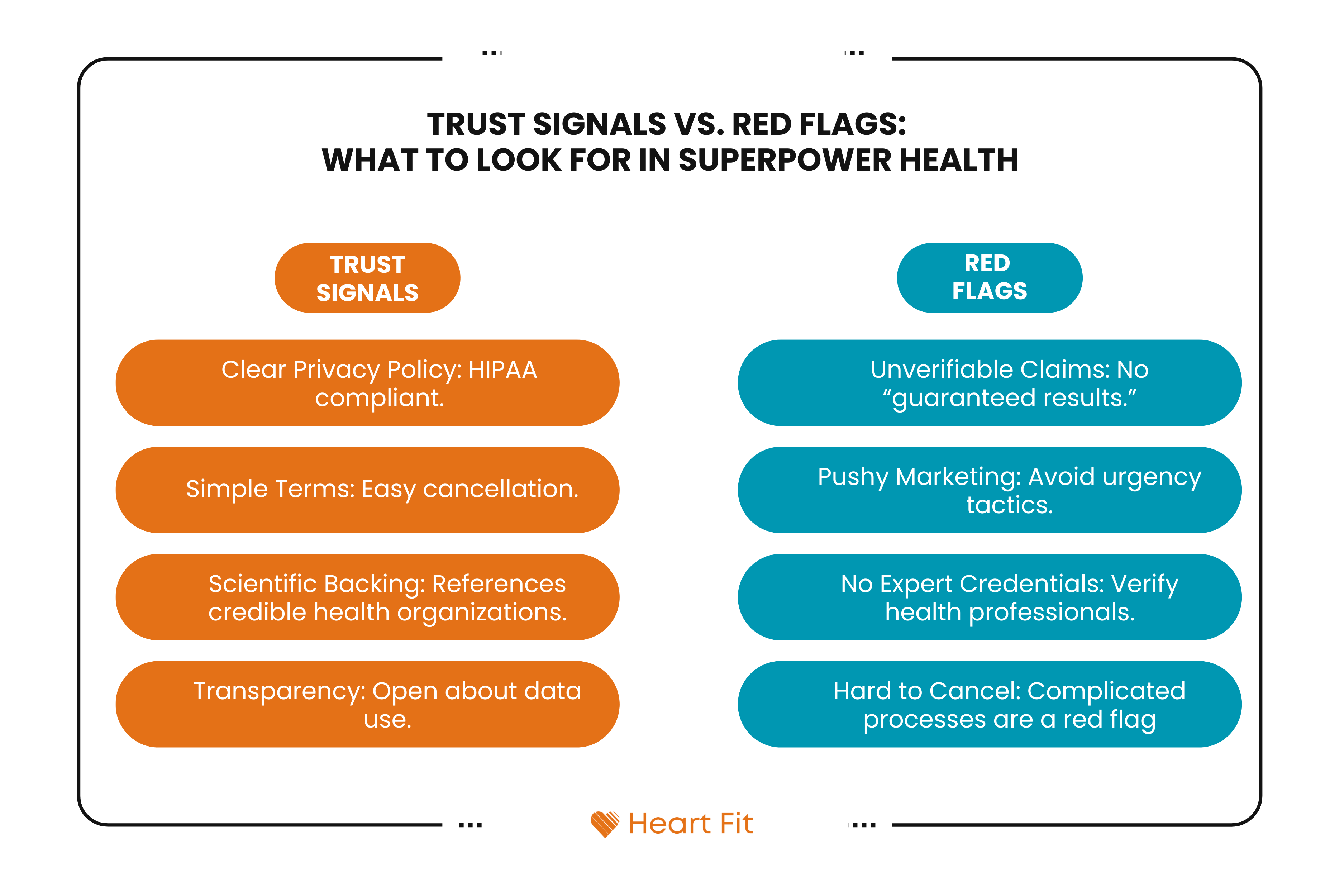Is Superpower Health Legitimate Company? This guide reviews leadership, claims, and reviews to help you decide if is superpower health legitimate company.

When you're looking for a new health service, the biggest question is always the same: can I actually trust this company? This article is for informational purposes only and is not a substitute for professional medical advice. Always consult a healthcare provider before making any lifestyle or medication changes.
Based on verifiable evidence, Superpower Health appears to be a legitimate company. It has secured substantial venture capital funding, is experiencing significant growth, and is backed by high-profile investors. However, the legitimacy of the company does not automatically mean its health services are effective or necessary for every individual.
In the crowded digital wellness space, it's essential to look beyond marketing to determine a company's credibility. A proper investigation involves examining its financial stability, the expertise of its team, and its data privacy practices. For Superpower Health, several key indicators point to a solid operational foundation.
The company's stated mission is to provide accessible and actionable health data, moving away from the traditional healthcare model that often requires symptoms for comprehensive testing. By offering a wide range of biomarker tests, Superpower aims to empower individuals to take a more proactive role in their well-being. But is this a sustainable business or simply a passing trend?
One of the clearest signals of a company's legitimacy is its ability to attract serious investment and demonstrate real growth. Superpower Health, a San Francisco-based startup, has built impressive momentum in the competitive U.S. digital health market.
As of 2025, the company has an estimated annual revenue of $18 million and a team of 78 employees, reflecting a massive 105% increase in its workforce over the last year. Since its founding, Superpower has raised $34 million in total funding. That includes a recent $30 million Series A round led by major venture capitalists and backed by celebrity investors. This level of financial backing is a strong vote of confidence. You can explore their financial journey and growth metrics on Growjo's company profile on Superpower.
This infographic gives a quick snapshot of Superpower Health's key financial and growth milestones.

These figures- $34M in funding, 105% growth, and $18M in revenue - portray a well-funded company undergoing aggressive expansion.
To provide a clear, at-a-glance view, let's break down the key factors into a simple scorecard. This will help organize the various elements that contribute to a comprehensive picture of Superpower Health's trustworthiness.
This table summarizes the key indicators used to evaluate Superpower Health, serving as a quick reference for judging the company's foundation.
Indicator Assessment: Why It Matters. Financial Backing is Strong. Raised $34 million from reputable investors.Shows that seasoned investors see long-term potential and have vetted the business model.Company Growth Rapid. 105% headcount growth and $18 million in annual revenue.Indicates market demand and operational momentum, suggesting it's not just a fleeting venture. Leadership & Expertise will be determined. We'll investigate their credentials in the next section. The team's background in medicine and technology is crucial for the credibility of their health services. Data Privacy is determined. A deep dive into their privacy policy is needed. How they handle sensitive health data is a non-negotiable trust factor for any health company. Customer Feedback will be determined. We need to analyze patterns in reviews and complaints. Real-world user experiences often reveal what marketing materials may not.
This scorecard provides a framework. While the financial indicators are positive, other critical areas require a closer look.
The following sections will delve deeper into each of these areas-especially leadership, data privacy, and customer feedback provide the evidence needed for an informed decision.
When evaluating any health company, a primary question should be: who is in charge? A company's credibility often mirrors that of its leadership. To determine if Superpower Health is a trustworthy entity, we must examine the professional backgrounds of its leaders—from the founders to the medical advisors.
Their collective experience (or lack thereof) in health, technology, and science offers a clear window into the company's foundation.
The leadership’s track record is a significant piece of the puzzle. Have they built successful companies before, particularly in a heavily regulated field like healthcare? Or is their expertise primarily in marketing and consumer products? A team with deep roots in both medicine and technology is better equipped to handle the complexities of personal health data.
Superpower Health was co-founded by CEO Jas Bagniewski and CTO Simon Defarges, who have a history of building consumer-focused businesses together. Before this venture, they co-founded Eve Sleep, the direct-to-consumer mattress company that eventually went public. This demonstrates their ability to build a brand and scale an e-commerce business.
What is less clear is their direct experience within the healthcare industry. This is not necessarily a disqualifier, but it places significant emphasis on their medical advisory board. Strong business acumen is essential for a company's survival, but in the health sector, it must be balanced with rigorous medical and scientific oversight. It is crucial to determine if they have surrounded themselves with individuals possessing strong clinical and research credentials.
This is a critical point for a health company’s scientific legitimacy. A robust advisory board should include practicing physicians, researchers, and specialists affiliated with respected institutions. Their involvement must be active in shaping the company’s products and protocols, not merely a marketing endorsement.
Superpower Health's board features specialists whose credentials can be verified. When conducting due diligence, here is what to look for:
A Note on Due Diligence: Always take a few minutes to verify these credentials yourself. A company’s legitimacy is significantly enhanced when its advisory board is composed of verifiable experts, not just personalities.
By cross-referencing these experts, you can form a clearer picture of whether Superpower Health’s foundation is built on solid medical science or if it leans too heavily on its consumer-brand expertise.
Superpower Health’s central promise is to help you "optimize your health" through a deep analysis of your blood biomarkers. But what does that mean in practice? Let's examine their core services and the scientific basis for their claims.
The main offering is access to a large panel of over 100 blood tests. Superpower claims many of these are difficult for the average person to obtain through a typical doctor's visit. The goal is to create a detailed picture of your internal health, covering everything from heart disease markers to hormone levels.
A central part of their pitch is that analyzing a large number of biomarkers provides more insight than a standard annual physical. Biomarkers are measurable indicators of a biological state—for example, LDL cholesterol (the "bad" kind) or hemoglobin A1c, which provides an average of your blood sugar levels over several months.
The underlying concept is to shift from reactive treatment of problems to proactive health management. This aligns with the growing trend toward preventative medicine. However, there is a significant difference between receiving a large amount of data and understanding its practical application.
Important Disclaimer: This article is for informational purposes only and is not a substitute for professional medical advice. You should always consult with a qualified healthcare provider before making any changes to your lifestyle, diet, or medication.
The value of testing biomarkers is well-established in standard medical practice. Organizations like the American Heart Association (AHA) use cholesterol levels to assess cardiovascular risk. Similarly, the National Institutes of Health (NIH) uses the A1c test as a key tool for diagnosing and managing diabetes. Superpower is essentially making these established scientific tools more accessible to the public.
Receiving your results is just the first step. Superpower then provides an "Action Plan" with food and supplement recommendations based on your bloodwork. While personalized advice is appealing, it's important to ask how these suggestions are generated.
The platform provides personalized insights, but it is crucial to remember this is not a medical diagnosis. A common challenge with this type of testing is that results falling slightly "out-of-range" do not automatically indicate a problem—a point a healthcare provider would likely emphasize. To see how Superpower's model compares to others, check out our comparison of Mito Health vs Superpower Health.
In short, Superpower Health uses validated medical tests to provide health data. The real value—and potential risk—lies in the interpretation and presentation of that data. The service can be a powerful tool for initiating a more informed conversation with your doctor, but it should not be seen as a replacement for professional medical consultation.
A company’s claims are one thing, but the real story often comes from the people using the service. To get a clear picture of Superpower Health's legitimacy, it is necessary to examine customer experiences. Sifting through feedback on public forums like Trustpilot, Reddit, and the Better Business Bureau (BBB) provides a look behind the marketing.

A consistent pattern emerges from user feedback: enthusiastic praise alongside significant, recurring complaints. This paints a complex but realistic picture.
The most significant benefit for satisfied customers is the sheer volume of data they receive. Many users are pleased to see results for over 100 biomarkers, feeling it provides a level of insight they could not get from a typical doctor's appointment.
These users often point to the detailed "Action Plan" as a major advantage, appreciating the specific diet and supplement advice. The core idea is that seeing the numbers motivates tangible change. They feel empowered to adjust their lifestyle because they can track the impact on subsequent tests.
"I’m more motivated than ever to make lifestyle/diet changes, since I know I can check in on these numbers regularly," one user wrote. This sentiment appears frequently—the data provides the impetus they needed.
Conversely, negative reviews tend to focus on a few key frustrations. The most common complaint is related to customer service. Users report long wait times for answers, which can be particularly frustrating when dealing with complex health information.
Cost versus value is another point of contention. While some feel the investment is worthwhile, others question whether the insights truly justify the annual price. This feeling is exacerbated when the recommendations in their action plan seem generic. Additionally, some customers mention billing confusion and unexpected charges, which can erode trust.
Here is a quick summary of the most common feedback points.
Feedback Type Common Praises Common Criticisms Data & Insights Appreciates access to extensive biomarker data; feels empowering. The volume of data can be overwhelming without sufficient guidance. Action Plan: Provides clear, motivating steps for improvement. Recommendations can feel generic, not truly personalized. Customer: The platform itself is generally easy to use and navigate. Support response times are often slow, and interactions can be unhelpful. Billing & Cost worthwhile investment for those serious about proactive health. The annual fee feels steep for the level of support provided.
These themes offer a balanced view of the user experience, highlighting where the service excels and where it may fall short for some customers.
A company's handling of criticism is indicative of its legitimacy. When a company actively engages with negative reviews on sites like Trustpilot or the BBB, it's a positive sign that they are listening and attempting to resolve issues.
A pattern of generic, copy-pasted replies—or a complete lack of response—can be a red flag. Currently, Superpower Health's public engagement appears to be mixed. Some complaints receive a detailed, thoughtful response, while others remain unaddressed.
If you are weighing your options, comparing Superpower to its competitors can provide useful context. Our detailed comparison of Superpower, Function Health, and Mito breaks down the differences. Ultimately, these real-world user stories provide the most valuable reality check.
When evaluating a digital health company, a healthy dose of skepticism is beneficial. To determine if Superpower Health is a reliable service, you can use a simple framework to assess it—a method that applies to most wellness platforms. It involves looking for positive indicators while being vigilant for potential red flags.
Think of it as inspecting a house before purchase. You don't just admire the new paint; you examine the foundation. Here, we'll look past the marketing to see what supports the company.

Trustworthy health companies tend to be transparent because they prioritize user safety and are upfront about their operations. Here are a few positive signs:
A trustworthy company makes it easy to understand what you are signing up for. They embrace transparency because they believe in their product and respect their customers.
Conversely, certain practices should raise concerns. While not always definitive deal-breakers, they are serious warning signs that warrant deeper investigation.
A Critical Note on Health Claims: Be extremely skeptical of any service that promises "guaranteed" results or "cures." As the U.S. Food and Drug Administration (FDA) cautions, legitimate health products and services rarely claim to be a quick fix.
Keep an eye out for these red flags:
Using this checklist can help you cut through the marketing noise and make a practical assessment of whether a company like Superpower Health operates with integrity.
After reviewing their funding, leadership, product claims, and customer feedback, we can state with confidence: Superpower Health is a legitimate company. It is a well-funded startup with a clear mission: to provide individuals with access to in-depth biomarker testing that is often difficult to obtain through conventional channels.
However, a company's legitimacy does not mean its service is essential for everyone. Operationally and financially, they appear solid. They use established, standard laboratory tests for metrics like LDL cholesterol, the same type of markers relied upon by major health institutions like the American Heart Association.
Potential challenges appear to lie in the areas of customer service and the practical application of the vast amount of data provided. While having extensive information about your body can be beneficial, without proper medical guidance, it can also be overwhelming rather than empowering.
A Quick but Important Disclaimer: This guide is intended as a starting point for your own research. It is for informational purposes and is not a substitute for professional medical advice. The best way to use insights from a service like Superpower Health is to discuss them with your doctor.
Ultimately, whether Superpower Health is a worthwhile investment depends on a personal cost-benefit analysis. For a detailed look at the cost, you can read our full breakdown exploring if Superpower Health is worth the money.
Before signing up, it is advisable to consult with your doctor. Here are a few questions you might ask:
Involving your healthcare provider ensures that your choice is not only informed but also tailored to your unique health needs and goals. That professional consultation is always the most important step.
Here are answers to some of the most common questions about Superpower Health and similar services.
According to the American Heart Association, a normal resting heart rate for most adults is between 60 and 100 beats per minute (bpm). However, factors like fitness level, age, and medications can influence this range. For example, a well-trained athlete might have a resting heart rate closer to 40 bpm.
No, and it is not intended to. It is crucial to view tools like Superpower Health as supplements to your healthcare, not substitutes. The data and insights provided can be an excellent starting point for a more informed conversation with your doctor, but they do not replace their clinical expertise. Always consult a qualified healthcare provider for medical diagnosis and treatment.
This is a critical question for any digital health service. Before sharing health information, you should review the company's privacy policy to understand how your data is collected, stored, and used. Look for HIPAA-compliance, the U.S. federal standard for protecting sensitive patient health information. A company's transparency about its security measures, such as encryption and HIPAA protocols, is a key indicator of its trustworthiness.
The health technology space is expanding, offering many options. The "best" tool depends on your specific goals. Here are a few solid alternatives:
The right choice is the one that aligns with your personal health goals and keeps you motivated.
Ready to turn your health data into daily action? Heart Fit helps you build sustainable nutrition habits based on your bloodwork, making healthy choices simple and rewarding. Start your free trial today and take control of your heart health.